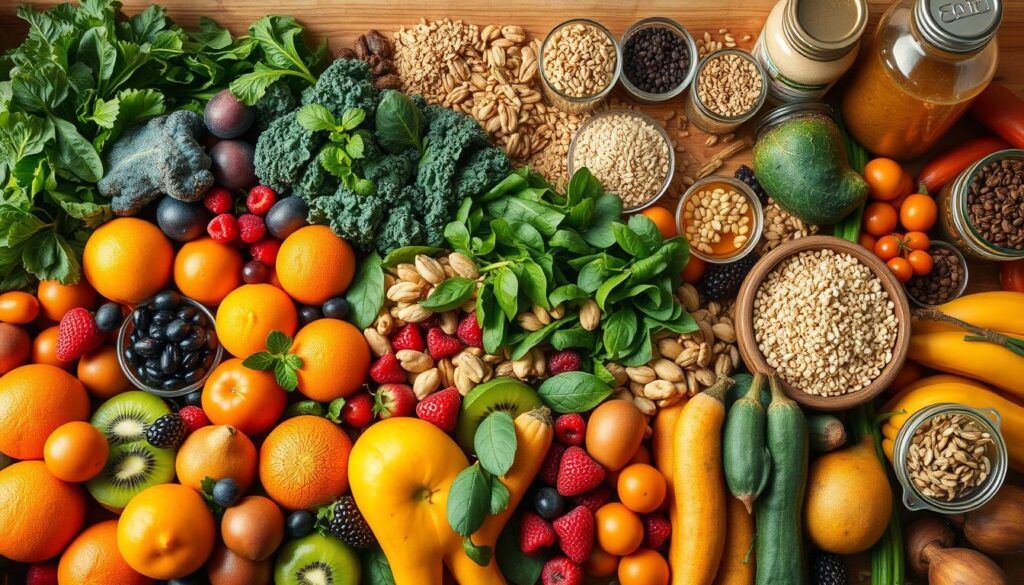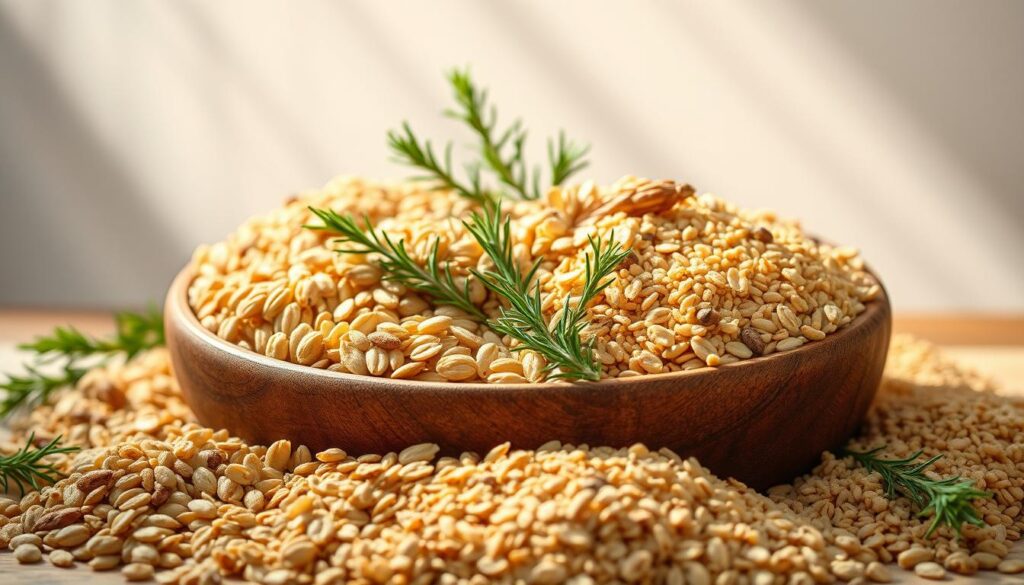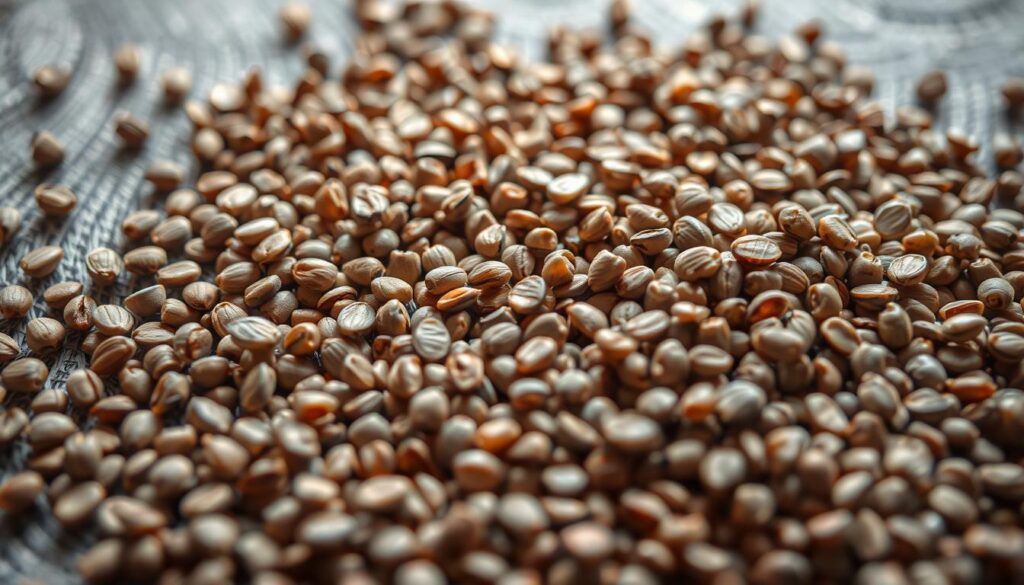The food you eat plays a significant role in your energy levels. Consuming the right nutrients can help you stay energized, while a poor diet can leave you feeling sluggish.
Eating a large meal, for instance, can make you feel lethargic because your body diverts energy to digest the food.
Discover how incorporating specific nutrient-rich foods into your diet can help boost your energy levels and support overall health.
Key Takeaways
- Learn how certain foods can significantly boost your energy levels throughout the day.
- Understand the science behind energy metabolism and how nutrients work together.
- Explore the connection between dietary choices and overall energy levels.
- Gain insights into the nutritional benefits of energy-boosting foods.
- Examine recent studies on the effectiveness of specific foods in combating fatigue.
Understanding Energy-Boosting Foods
The relationship between the food you eat and your energy levels is more complex than you might think. The food you consume plays a crucial role in determining your energy levels throughout the day.
How Food Affects Your Energy Levels
Different foods are metabolized through various biochemical pathways, affecting your energy production at the cellular level. Consuming the right balance of nutrients is essential for maintaining optimal energy levels. For instance, nutrition tips for workouts routines can provide insights into how diet influences energy.
The Science Behind Food and Fatigue
Key nutrients like iron, B vitamins, and magnesium play critical roles in energy metabolism. Deficiencies in these nutrients can lead to persistent fatigue. For example, a 2018 study highlighted the importance of Vitamin B12, folic acid, Vitamin C, magnesium, and zinc in combating chronic fatigue syndrome (CFS). Foods rich in these nutrients include clams, dark leafy greens, strawberries, nuts, and legumes. Ensuring adequate intake of these nutrients through your diet can help alleviate fatigue and maintain your energy levels.
As you understand the science behind food and fatigue, you can make informed choices about your diet to boost your energy levels. Incorporating a balanced mix of protein, fiber, and complex carbs can help stabilize your blood sugar and provide sustained energy.
Nutrient-Rich Fruits for Sustained Energy
Incorporating the right fruits into your diet can significantly boost your energy levels throughout the day. Fruits are a natural source of essential nutrients, vitamins, and minerals that help in maintaining your energy.
Bananas: Nature’s Perfect Energy Bar
Bananas are a great source of energy due to their high content of easily digestible carbohydrates. They are also rich in potassium, an essential mineral that helps in maintaining healthy energy levels.
Berries and Their Antioxidant Power
Berries such as blueberries, strawberries, and raspberries are packed with antioxidants that help in reducing oxidative stress and inflammation, thereby boosting your energy levels. Their high fiber content also helps in sustaining energy release.
Avocados: Healthy Fats for Lasting Energy
Although often considered a vegetable, avocados are a fruit that provides healthy fats, which are crucial for sustained energy. The fiber and various vitamins in avocados also contribute to their energy-boosting properties.
Citrus Fruits and Other Energy-Boosting Options
Citrus fruits like oranges, grapefruits, and lemons are rich in vitamin C, which plays a significant role in energy metabolism and combating fatigue. Other fruits like apples, pears, and tropical options such as pineapple and mango also offer unique nutritional benefits that can help boost your energy.
By incorporating these nutrient-rich fruits into your daily routine, you can experience a natural boost in your energy levels. Whether it’s through morning smoothies, afternoon snacks, or as part of your meals, these fruits can help you stay energized throughout the day.
Superfoods for Energy Boost: Proteins and Whole Grains
The right combination of lean proteins and whole grains can significantly impact your energy levels throughout the day. Incorporating these foods into your diet can help you stay energized and focused.
Lean Proteins That Fight Fatigue
Lean proteins are essential for maintaining energy levels. They help build and repair muscles, ensuring that your body functions optimally. Foods rich in lean proteins include chicken, turkey, fish, and lean beef. These proteins are vital for sustained energy.
Eggs: The Complete Protein Package
Eggs are considered a complete protein because they contain all nine essential amino acids. They are also rich in B vitamins and choline, which help in energy production and brain function. Including eggs in your breakfast can provide a boost to your energy levels.
Yogurt and Other Dairy Options
Yogurt is another dairy product that can help fight fatigue. It contains protein, calcium, and probiotics, which support digestive health. Other dairy options like milk and cheese also provide energy-boosting nutrients.
Whole Grains: Oats, Quinoa, and Brown Rice
Whole grains are rich in complex carbohydrates, fiber, and various nutrients that help sustain energy levels. Oats, for instance, contain beta-glucan, a type of fiber that regulates blood sugar and provides sustained energy. Quinoa is a complete protein grain that contains all essential amino acids, making it an excellent energy-boosting food. Brown rice, with its fiber content, slows down the digestion of carbohydrates, releasing energy more slowly.
| Whole Grain | Energy Benefit |
|---|---|
| Oats | Rich in beta-glucan, regulates blood sugar, and provides sustained energy |
| Quinoa | Complete protein grain, contains all essential amino acids |
| Brown Rice | Fiber content slows down carbohydrate digestion, releasing energy slowly |
Incorporating these whole grains into your diet can help you maintain optimal energy levels. Experiment with different recipes to find enjoyable ways to consume oats, quinoa, brown rice, and other whole grains.
Power-Packed Nuts, Seeds, and Vegetables
To maintain your energy throughout the day, consider adding nuts, seeds, and a variety of vegetables to your meals. These foods are not only rich in nutrients but also provide sustained energy.
Energy-Boosting Nuts and Their Benefits
Nuts like almonds and walnuts are rich in healthy fats and antioxidants, which help in maintaining your body’s energy levels. They are also a good source of fiber and protein.
Seeds: Small Packages with Big Energy
Seeds such as chia and flax are packed with fiber, antioxidants, and healthy fats, making them an excellent snack for an energy boost. For more on healthy eating, visit our guide on healthy eating meal plans.
Leafy Greens and Colorful Vegetables
Leafy greens like spinach and kale are rich in iron, which is crucial for transporting oxygen to your cells, thereby boosting your energy. Colorful vegetables like bell peppers and carrots are high in vitamins and antioxidants.
Sweet Potatoes: The Okinawan Secret to Longevity
Sweet potatoes, particularly the purple variety consumed by Okinawans, are rich in complex carbs and fiber, providing sustained energy. They are also loaded with phytonutrients and antioxidants.
Hydration and Beverages for Optimal Energy
Optimal energy isn’t just about food; hydration plays a significant role too. Your body’s energy levels are significantly influenced by what you drink, making hydration an essential aspect of your daily routine.
Water: The Most Essential Energy Source
Water is the most critical component for maintaining energy levels. Even mild dehydration can cause fatigue, headaches, and difficulty concentrating. Drinking enough water throughout the day helps in maintaining blood flow and oxygen delivery to cells, thereby supporting your energy needs.
To stay hydrated, aim to drink at least eight glasses of water a day. You can also consume water-rich foods like cucumbers, celery, and watermelon to contribute to your daily hydration needs.
Coffee and Tea: Benefits Beyond Caffeine
Coffee and tea are popular beverages that provide a temporary energy boost due to their caffeine content. However, they offer more than just a caffeine kick. Both coffee and tea are rich in antioxidants, which help protect your cells from damage and support overall health.
For an energy boost, consider having a cup of coffee or tea in the morning or before a workout. Be mindful of the amount of caffeine you consume to avoid jitters and an energy crash later.
When to Consume Energy-Boosting Foods
Timing is everything when it comes to consuming energy-boosting foods. Eating several smaller meals throughout the day can help maintain stable blood sugar levels and prevent energy dips. Consider having a balanced snack that includes protein and complex carbohydrates about an hour before a workout to boost performance and endurance.
Understanding the strategic timing of your meals and snacks can help you avoid fatigue and maintain optimal energy levels throughout the day.
Conclusion
Energizing your day with the right foods is not just about quick fixes, but about adopting a balanced dietary approach that incorporates a variety of energy-boosting superfoods. By understanding the importance of combining proteins, complex carbohydrates, healthy fats, and plenty of fruits and vegetables, you can maintain steady energy levels throughout the day.
To maximize the benefits of these superfoods, it’s essential to stay properly hydrated and adopt a holistic approach that includes adequate sleep, regular physical activity, and stress management. For more information on the benefits of healthy eating, you can explore additional resources to support your journey towards optimal energy and overall health.








